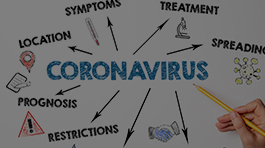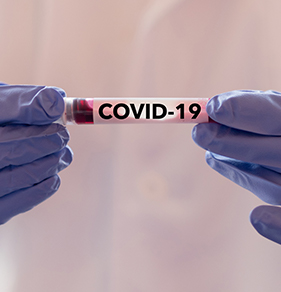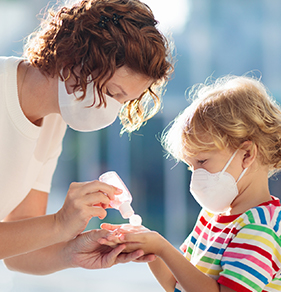August 19, 2020
COVID-19 has stressed pretty much everyone in the United States – especially those who work in healthcare. I read a recent survey where over 90% of the participants said COVID-19 had adversely affected their sleep: 43% of respondents reported disturbed sleep patterns and 23% reported they are sleeping less than they used to1. So, I whipped up a simple, 10-ingredient recipe that can help you get a good night’s sleep.
#1: Create a Routine Schedule
According to multiple studies, performing basic activities such as bedtime, wake time, eating, dressing, and bathing at the same time every day was found to improve sleep quality. Start organizing your day with a regular bedtime and wake time, then go from there. Drink your cup of coffee, get dressed, and stick to as much of a schedule as you can. This is especially important if you are working from home and have less structured days.
#2: Kick Start Your Circadian Rhythm
First thing in the morning: open all blinds, curtains and turn on every light – get the circadian rhythm kick-started. Don’t wear sunglasses in the morning – let the sun shine in! After dinner, lower the lights gradually. Keep noise levels/lighting low all evening and shut off all the lights (including TV) when you go to sleep.
#3: Limit Caffeine and Other Cravings
The warmer weather of summer typically makes it easier to limit coffee, tea, chocolate, and cigarettes. I suggest skipping the ice coffee and tea and enjoy the bountiful (and relatively inexpensive) summer fruits and vegetables. As far as alcohol, here’s the scoop: it makes you fall asleep quicker, but the ensuing sleep is more fragmented and fitful; consider reducing your consumption or, even better, skip it.
#4: Try a Sleepy Scent
These five essential natural oils will surprise you in their ability to help make your sleep cycles deeper and better: lavender, citrus, peppermint, chamomile, and cinnamon. Place a few drops of one of these oils (or find a sleep spray with the oil infused in it) on your pillow before bed and inhale deeply to take in the aroma.
#5: Practice Meditation or Prayer
Meditation and prayer are incredibly powerful ingredients for stress reduction and sweet dreams. In fact, both are linked to increased self-awareness, patience and creativity, as well as a reduction in negative emotions.
In my experience, meditation and prayer can be a little difficult to get into, especially in this age of constant distractions and racing thoughts. This is where reading written prayers (like those in the Book of Common Prayer), faith, having a church community and guided meditations might help
#6: Do a Low-Impact Exercise
Everyone knows that low-impact exercise comes with the benefits of improved strength, lower blood pressure, and reduced injury, but did you know it can also help you sleep deeper and longer?
Low-impact exercise, such as yoga, walking and stretching, allow you to focus on breath and gentle movement. In these days of quarantine, I have found free YouTube stretching programs or wellness activities from Aegis to be incredibly accessible and fun. If you want to get more serious about exercise, consider apps like Peloton or Daily Burn – they have great classes for every level and feature much more than just bike riding.
#7: Put Down the Phone
Really. Step away and put it down. According to a recent survey, over half of all respondents pointed to increased screen time as a major factor for their out of whack sleep patterns. This comes as no surprise, as many of us are spending more and more (and more) time on our phones and computers, both working and almost robotically scrolling.
The habit, however embarrassing to admit, is a wildly difficult one to break. And it’s not your fault – some of the smartest people in the world are designing the internet and our phones to keep you on them. Many of the same feel-good brain chemicals and reward loops that drive addictions are also released and activated when we check our phones.
Maybe it is time to start actively trying to break the habit of reaching for your phone or scrolling on the internet. The first step? Take a look at what you’re doing. Begin with observing exactly how you interact with your cell phone; the more you understand and recognize your habits, the more you can consciously work to change them.
#8: Work Your Mind and Your Hands Offline
Do a puzzle. Learn how to play chess, solitaire or an instrument. Knit, play Scrabble, cook, garden or make bread. When engaging our brains and our hands, it’s much easier to let the rest of the world fall away.
Encourage the people you’re self-isolating with to do some activities with you, or if you’re alone, do them yourself! You’ll be working your brain in a way that’s beneficial for both the long and the short term.
Not only will activities like this help improve your memory and work both sides of your brain, you’ll also be working to relieve stress. By focusing on one thing, you’re ridding yourself of extraneous thoughts—one of the defining characteristics of rest and relaxation.
#9: Limit the News – Shut Off the TV
Anxiety is one the top factors affecting our sleep patterns. It’s a no-brainer that removing some stressors – like the attention we give to the 24-hour news cycle – will help. I’m not recommending totally ignoring the news, but I do think you should limit your intake. Staying glued to the news cycle may be increasing your anxiety by feeding into the belief that if we have enough information, we can control what happens. But, the more we seek certainty over what will happen in the future, the more anxious we will feel. It is impossible to be 100% certain of what the future holds. Take a step back, pause notifications on your news apps, and check them only when your schedule permits.
#10: Be Kind to Yourself
You’re not going to make all these changes and adaptations overnight, and that’s okay! Give yourself reasonable goals, slowly incorporate some or all of our advice week by week, and I bet you’ll begin to feel lighter and more grounded. You’ll start to feel your stress melt away a little bit, and, of course, sleep more soundly. Sweet dreams!
1 Coronavirus & Sleep: How is COVID-19 Affecting Sleep Patterns [2020 Survey] https://pillowinsider.com/coronavirus-sleep-study/
This article was created by Dr. James Avery and provided to Aegis Therapies, Inc. for informational purposes only, it does not provide medical advice. Due to the everchanging circumstances related to COVID-19, the information can change at any time and therefore, Aegis Therapies, Inc. and its affiliates and subsidiaries do not warrant or guarantee the accuracy of this information. If you have questions, you should conduct your own research.








